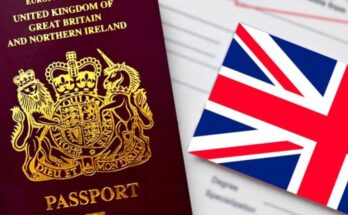United Kingdom Business Visa Requirements: Understanding the visa requirements for business purposes in the United Kingdom is crucial for entrepreneurs and investors looking to operate within this dynamic market.
Proper knowledge ensures compliance with legal frameworks, enabling smoother business operations and preventing potential legal hurdles.
This guide provides essential insights into navigating the UK’s business visa landscape.
Eligibility Criteria for the United Kingdom Business Visa
To obtain a United Kingdom business visa, applicants must meet specific eligibility criteria designed to ensure that only genuine business persons can engage in business activities within the UK. Here’s a detailed look at who qualifies for a business visa and the specific conditions that must be met:
Who Qualifies for a Business Visa?
- Entrepreneurs and Business Owners: Individuals planning to set up or run a business in the UK are prime candidates for this visa. This includes both new entrepreneurs and those looking to invest in existing UK businesses.
- Investors: High-net-worth individuals willing to make a substantial financial investment in the UK economy can apply. This often requires a minimum investment threshold.
- Representatives of Overseas Businesses: This includes employees of companies that aim to establish a UK branch or a wholly-owned subsidiary for an overseas parent company.
Specific Conditions and Criteria
- Financial Requirement: Applicants must demonstrate that they have sufficient funds to support themselves without needing public funds. This includes both initial investment capital and personal living expenses.
- Business Plan: A detailed and viable business plan is crucial, showing the feasibility and economic benefit of the business to the UK.
- English Language Proficiency: Applicants must meet certain English language requirements to ensure they can effectively communicate in a business environment.
- No Criminal Record: A clean legal background is essential, with applicants required to disclose any criminal convictions.
- Immigration History: Applicants should have a positive immigration history, including adherence to any previous visa limitations or conditions.
By satisfying these criteria, immigrants demonstrate their capability and intent to contribute positively to the UK’s economy, ensuring that the business visa is awarded to individuals who are likely to succeed in their entrepreneurial ventures.
Types of Business Visas Available in the United Kingdom
The United Kingdom offers a variety of business visas tailored to different professional needs, enabling entrepreneurs, investors, and corporate professionals to contribute to the UK’s economy. Understanding the specifics of each visa type will help you determine which is best suited for your business goals.
- Tier 1 Entrepreneur Visa: This visa is designed for individuals who want to start or take over an existing business in the UK. Applicants must demonstrate access to at least £50,000 in investment funds and a viable business plan. This visa is ideal for hands-on business managers looking to actively manage a business in the UK.
- Tier 1 Investor Visa: Suitable for high-net-worth individuals, this visa requires an investment of at least £2,000,000 in the UK economy. It’s perfect for those who prefer to invest rather than manage a business day-to-day. Investors can benefit from a fast-track option for permanent residency depending on the amount invested.
- Innovator Visa: Aimed at experienced businesspeople with innovative, viable, and scalable business ideas, this visa requires endorsement from an authorized body. With a lower investment requirement of £50,000, it is a good fit for those looking to start a new enterprise with high growth potential.
- Start-up Visa: This visa category is for early-stage but high-potential entrepreneurs who do not yet have significant business funds. No initial investment is required, but applicants must be endorsed by a UK higher education institution or a business organization with a history of supporting UK entrepreneurs.
- Representative of an Overseas Business Visa: This visa is for individuals who are either the sole representative of an overseas company planning to set up a UK branch or a subsidiary, or are an employee of an overseas newspaper, news agency, or broadcasting organization posted on a long-term assignment to the UK.
- Global Business Mobility Visas: A new set of visas introduced to cater to different business needs, including senior or specialist workers, graduate trainees, and service suppliers. These visas are designed for employees of multinational companies needing to transfer to the UK branch for specific assignments.
However, each visa type provides distinct opportunities and requirements, tailored to facilitate various business activities and investment levels in the United Kingdom.
Required Documents for United Kingdom Business Visa Application
These documents are crucial as they help the visa officers understand your business background, intentions, and financial stability. Here is a comprehensive list of the required documentation along with tips on how to prepare and present these effectively:
Comprehensive List of Required Documentation
- Valid Passport: Your passport should have at least six months validity beyond your planned date of departure from the UK and at least two blank pages.
- Visa Application Form: Complete the online application form accurately and truthfully.
- Two Recent Passport-Sized Photographs: Ensure these comply with the UK government’s photo requirements.
- Letter of Invitation from the UK Company: This letter should detail the nature of the business, the duration of the visit, and the company’s contact information.
- Proof of Financial Means: Bank statements for the last six months to show you can support yourself during your stay.
- Business Bank Statements: To demonstrate the financial health of your business.
- Business Registration Documents: Confirming the legality and the operational status of your company.
- Detailed Travel Itinerary: Including any meetings, events, or business activities planned during your stay.
- Accommodation Proof: Hotel reservations or an invitation letter if staying with a host.
- Travel Insurance: Covering the duration of your stay in the UK.
Tips on How to Prepare and Present These Documents Effectively
- Organization: Arrange your documents in the order listed in the application guidelines. Use a clear folder or binder to keep them organized.
- Clarity: Ensure all copies are clear and legible. If necessary, provide certified translations of documents not originally in English.
- Completeness: Double-check each document for completeness and relevance. Missing documents can lead to delays or even visa denial.
- Honesty: Be truthful in all details provided. Inconsistencies can raise questions about your application’s credibility.
- Professionalism: When presenting your documents, keep them neat and avoid unnecessary annotations or marks. This shows attention to detail and respect for the process.
By following these guidelines and preparing your documents meticulously, you enhance your chances of a smooth application process for a United Kingdom business visa.
Application Process for a United Kingdom Business Visa
Securing a United Kingdom Business Visa involves a clear and straightforward process. This guide will walk you through each step, ensuring that you understand where to apply, the associated fees, and expected processing times.
Step-by-Step Guide on the Application Process:
- Check Eligibility: Before applying, ensure you meet the eligibility criteria for a United Kingdom Business Visa, which includes having a valid business reason for visiting the UK.
- Gather Necessary Documents: Compile required documents, including a valid passport, proof of financial means, business invitation letters, and any previous business dealings with the UK.
- Complete the Online Application: Visit the official UK Visas and Immigration website to fill out your application form. Be thorough and accurate with the information you provide.
- Pay the Visa Fee: The application fee must be paid online during the submission of your application. Fees vary based on visa type and the urgency of the application.
- Schedule an Appointment: Once your application is submitted and fees are paid, you will need to book an appointment at your nearest Visa Application Centre for biometric information collection.
- Attend Your Appointment: Go to your appointment with all the required documents and biometric data. Ensure you arrive on time and are prepared for a brief interview if necessary.
- Wait for Processing: After your appointment, your application will undergo processing. The time varies, usually taking 15-30 working days, depending on the type of service selected.
Where to Apply:
Applications should be submitted through the UK Government’s official Visas and Immigration website. This site is also a valuable resource for additional guidance and updates related to UK visa applications.
Fees and Processing Times:
- Standard Processing: Typically takes 15-30 working days and costs vary based on the exact visa category. Check the official website for the most current fee structure.
- Expedited Options: For faster processing, expedited service options are available at an additional cost. These can reduce the waiting time to as little as 5 working days.
By following these steps and preparing accordingly, you can streamline your UK Business Visa application process. Ensure that all information provided is accurate and documents are complete to avoid any delays.
United Kingdom Business Visa Financial Requirements
Applicants must present concrete evidence to substantiate their ability to support themselves and any dependents during their stay in the UK. Here’s a breakdown of the financial proof required and details on minimum investment amounts:
Proof of Financial Stability
- Bank Statements: Recent bank statements, preferably for the last 6 months, showing sufficient funds to cover living expenses and business activities in the UK.
- Income Evidence: Documents proving steady income, such as pay slips, dividend receipts, or profit and loss statements if self-employed.
Minimum Investment Amounts
- Initial Investment: For those applying under the Innovator visa category, a minimum of £50,000 in investment funds is required. This investment should be directed towards a new or existing UK business.
- Source of Funds: Applicants must provide a detailed account of the source of their investment funds, ensuring that the capital is obtained legally and is available for use in the business.
Additional Financial Documents
- Financial Forecasts: Detailed business plans accompanied by financial forecasts that illustrate the viability and growth potential of the business.
- Evidence of Additional Assets: If applicable, documentation of additional assets that strengthen the financial position of the applicant, such as real estate or other significant investments.
However, meeting these financial requirements is crucial for a successful visa application and ensures that the applicant can contribute positively to the UK’s business landscape.
Legal Obligations and Compliance
Understanding and complying with these rules not only facilitates a smooth business operation but also shields you from potential legal complications.
Legal Obligations of Holding a UK Business Visa
- Registration and Reporting: You must register your presence with local authorities and possibly the UK Visa and Immigration services, depending on the specifics of your visa.
- Tax Compliance: Ensure all your business activities are tax compliant as per the UK tax laws. This includes proper filing of tax returns and payment of any due taxes.
- Employment Regulations: If your business involves hiring staff, you must adhere to the UK employment laws, including fair wages, working conditions, and equal opportunity practices.
- Business Operations: Your business activities should align with the nature of the business stated in your visa application to avoid discrepancies.
- Renewal and Notification: Notify the UK Visa and Immigration services of any significant changes in your business, including change of address, nature of business, or leadership changes. Timely renewal of your visa is also crucial.
Importance of Compliance with UK Immigration Laws
Compliance with UK immigration laws is not just a legal requirement but also a critical component of your business’s integrity and reputation. Here’s why it matters:
- Legal Continuity: Compliance ensures that your business operations are uninterrupted by legal hurdles, which might otherwise lead to fines or even deportation.
- Reputation: Upholding the law enhances your reputation both with the government and within the business community, paving the way for future opportunities and partnerships.
- Financial Security: Adhering to the law avoids costly legal battles and penalties, securing your financial stability.
- Peace of Mind: Knowing that you are in full compliance with immigration laws allows you to focus on growing your business without the looming threat of legal issues.
However, understanding and fulfilling these legal obligations and compliance requirements is crucial for any business owner on a UK business visa, ensuring that your venture in the UK is both successful and lawful.
Renewal and Long-Term Stay Options
If you are holding a United Kingdom Business Visa, staying informed about your renewal options and pathways to long-term residency or citizenship is crucial. Here’s what you need to know:
How and When to Renew Your UK Business Visa
Renewing your UK Business Visa is a straightforward process, but it’s essential to start early to avoid any disruptions in your business activities. Here are the key steps:
- Check Expiry Date: Your visa expiry date is printed on your visa sticker or biometric residence permit. Start the renewal process at least 3 months before this date.
- Gather Documentation: Collect all necessary documents, including proof of ongoing business activities and financial stability.
- Apply Online: Complete the online application form on the UK Government’s official website. Ensure all details are accurate to avoid delays.
- Biometric Information: You’ll need to provide your fingerprints and a photo at a visa application center.
- Pay the Fee: Ensure you pay the renewal fee to process your application.
Timely renewal of your visa ensures that you maintain legal status and continue your business operations in the UK without interruption.
Options for Permanent Residency or Citizenship
For business immigrants looking to make the UK their permanent home, there are several pathways to consider:
- Indefinite Leave to Remain (ILR): After 5 years of continuous and lawful residence in the UK on a business visa, you may be eligible to apply for ILR. This status allows you to live and work in the UK without time restrictions.
- Citizenship by Naturalization: Once you have held ILR status for at least 12 months, you can apply for British citizenship through naturalization. Requirements include passing the ‘Life in the UK’ test and proving your knowledge of the English language.
However, understanding these options and preparing in advance can significantly smooth your transition from a temporary business visa holder to a permanent resident or citizen of the UK, allowing you to focus on growing your business and setting deeper roots in the community.
Common Challenges and Solutions
Applying for a United Kingdom Business Visa can present several challenges, but knowing how to address these effectively can streamline your application process. Below are common issues and practical solutions to help you navigate the complexities of the visa application.
1. Complex Documentation Requirements
Challenge: Gathering the extensive documentation required, including business plans and financial statements, can be daunting.
Solution: Start early and create a checklist based on the latest UK Visa and Immigration guidelines. Consider professional help from visa consultants to ensure all documents meet the required standards.
2. Meeting the Financial Requirements
Challenge: Proving you have sufficient funds to support yourself without accessing public funds in the UK.
Solution: Maintain detailed and up-to-date financial records. Provide clear evidence of your business’s financial health and your personal financial status through bank statements and other financial documents.
3. Navigating the Points-Based System
Challenge: Understanding how to meet the points criteria, which includes points for sponsorship, qualifications, and prospective earnings.
Solution: Familiarize yourself with the points system on the official UK Government website. Ensure every point is covered through proper documentation and justification.
4. Long Processing Times
Challenge: Visa processing times can be lengthy, sometimes taking months, which can be stressful and uncertain.
Solution: Apply as early as possible and consider using expedited service options if available. Keep track of your application status online and be prepared for any requests for additional information.
5. Visa Interview Preparedness
Challenge: The visa interview can be intimidating, and applicants must be prepared to answer all questions thoroughly and truthfully.
Solution: Prepare for the interview by reviewing potential questions related to your business and its contribution to the UK economy. Practice clear and confident responses.
By addressing these challenges with detailed preparation and clear strategies, you can enhance your chances of a successful United Kingdom Business Visa application.
FAQs about United Kingdom Business Visa Requirements
1. Who needs a business visa to enter the United Kingdom?
Anyone from outside the European Economic Area (EEA) and Switzerland who wishes to engage in business activities in the UK may need to apply for a business visa. This includes attending meetings, conferences, and conducting short-term work.
2. What are the main types of business visas available for the UK?
The UK offers several business visa options, such as the Standard Visitor visa for short visits and the Innovator visa for those setting up or running a business in the UK. Each visa has specific requirements tailored to different business needs.
3. How long can I stay in the UK on a business visa?
The duration of your stay depends on the visa type. For example, the Standard Visitor visa typically allows stays up to 6 months, while the Innovator visa can permit residence for up to 3 years, extendable if certain conditions are met.
4. What documents are required to apply for a UK business visa?
You’ll need to provide various documents, including a valid passport, proof of financial means, a detailed business plan (for certain visas), and proof of business activities planned in the UK. Additional documents may be required depending on the specific visa category.
5. How much does it cost to apply for a business visa to the UK?
Visa application fees vary. For instance, the Standard Visitor visa fee is currently around £95, while the Innovator visa can cost significantly more. Always check the latest fees on the official UK government website.
6. How long does it take to process a UK business visa application?
Processing times can vary widely based on visa type and individual circumstances. Typically, visitor visas are processed within 3 weeks, but it can take longer during peak periods or if additional information is needed.
7. Can I bring family members with me on a UK business visa?
This depends on the visa type. Some business visas, like the Innovator visa, allow you to bring family members, including spouses and children, as dependents. However, visitor visas do not typically permit dependents.
8. What happens if my UK business visa application is denied?
You will receive a letter explaining the reasons for the refusal. You can apply for an administrative review if you believe there was an error in the decision-making process. For some visas, it may also be possible to reapply or appeal.
Conclusion
In summary, understanding the United Kingdom’s business visa requirements is essential for any entrepreneur or business professional aiming to engage in commercial activities within the UK. From obtaining the correct type of visa such as the Standard Business Visitor visa or the Innovator visa, to meeting specific financial thresholds and providing comprehensive business plans, the process demands careful attention to detail.
We recommend consulting with a legal expert who specializes in UK immigration law to provide personalized advice and guidance tailored to your unique situation. This step is crucial not only to ensure compliance with immigration laws but also to maximize your chances of a successful visa application. Don’t hesitate to reach out to a qualified immigration attorney who can help navigate the complexities of the process and set your business venture on the path to success in the United Kingdom.
References
For further information and to validate the details provided on United Kingdom business visa requirements for immigrants, please consult the following reputable sources:
- Gov.UK Official Portal – Provides comprehensive and up-to-date information on visa application procedures and requirements for the United Kingdom. Visit Gov.UK
- British Chamber of Commerce – Offers detailed insights and resources for business professionals looking to establish a presence in the UK. Explore British Chamber of Commerce
- UK Visas and Immigration Guide by Immigration Law Practitioners’ Association – A thorough guide discussing various aspects of UK immigration laws including business visas. Read UK Visas Guide
- The UK Home Office – For official policy updates, forms, and contact information related to UK business visas. Check the UK Home Office
These resources are authoritative and will provide you with the necessary details to assist with any queries related to obtaining a business visa for the UK.



